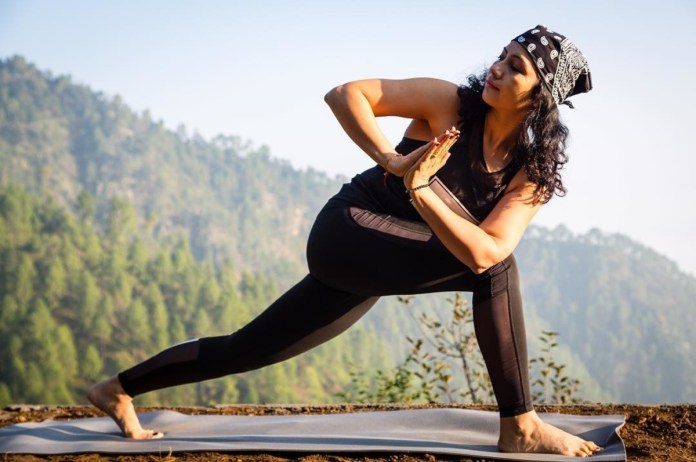Yoga is a physical, mental and spiritual practice that originated in our country. It has been practised over the years, many different interpretations of the meaning of Yoga have developed. All the different types of Yoga have their own emphasis and practices. Since 21st of June each year is celebrated as International Yoga Day, we got in touch with the internationally certified yoga instructor Komal Sodhi to tell us all about this practice. Read on!
Hi Komal, first of all, tell us all about yourself. How you got into yoga, your practice and your Yoga centre.

I am an Internationally certified Yoga instructor from Sivananda Ashram in Kerala. I have been teaching and practising yoga since I was a teenager. I am the Owner & Director of my own studio, ‘Komal Yoga and Fitness Studio’ located in Dlf phase 4, Gurgaon.
My other passion is mountaineering and trekking which takes me out of my comfort zone and challenges me to seek my true potential. My program Synthesis takes people outdoors on Yoga retreats and Treks to be close to nature and experience life in its true and pure form.
Wow, that’s great So, can you shed some light on the origin of Yoga? We know it’s an ancient practice. Could you share some knowledge on it?

Yoga is an ancient practice which includes a group of physical, mental and spiritual practices. In Indian tradition, yoga is more than just a physical practice; it has a meditative and spiritual core. Ancient yogis considered the body simply as a tool in order to develop the mental faculties. They believed that there is a far higher purpose to life than merely surviving. Yoga gurus from India later introduced yoga to the West, where a very different form of modern yoga emerged, with an increasing number of asanas and few other practices and it became popular as a system of exercise across the Western world. According to the yoga sutras of Patanjali: “Yoga is the suppression of the activities of the mind”. The 4 main branches of yoga are Karma Yoga, Raja Yoga, Bhakti Yoga and Jnana Yoga. Modern yoga was created by the blending of Western styles of gymnastics with postures from Hatha yoga.
How does Yoga help in improving the overall health of a person?

Modern yoga is a physical activity consisting largely of asanas, sometimes accompanied by the breathing exercises of pranayama, and usually ending with a period of relaxation or meditation. Regular yoga practice increase body awareness, relieves chronic stress patterns, relaxes the mind, centres the mind and increases concentration. It makes the body strong and healthy without any side effects with the least amount of injury if done under the guidance of a qualified teacher. People of any age or gender can practise yoga.
There are a lot of myths surrounding Yoga. Especially how it doesn’t help in weight loss. Can you tell us about that?

Regular yoga practice does influence weight loss, but it is slower and burns fewer calories than running and swimming. Having said that, yoga actually increases one’s mindfulness, so it makes one aware of one’s body’s requirements. A person who practices yoga becomes aware of what one is eating and starts to seek foods that are healthier. A lot of people eat more when they are stressed and since yoga helps to reduce stress, one starts to eat less. Challenging and vigorous yoga practice does help in burning more calories. This will increase the body’s metabolism and improve the shape of the body.
What asanas according to you are the best ones when it comes to weight loss?

Dynamic yoga practice which includes Surya Namaskars, Warrior poses, Shoulderstand etc and also some breathing exercises such as Kapala Bhati and Bhastrik will help in weight loss. Practising meditation every day will reduce stress which in turn will help in weight loss by reducing mindless eating.
Talking of yoga, meditation and mental health, how are all three connected? How can Yoga help in better mental health?

The combined practice of Yoga and Meditation will improve mental health. Practising Yoga will make the body fit and flexible enough for us to be able to sit for meditation. The body is a reflection of the state of our mind. A person who is mentally stressed and tense holds a lot of physical tension and stiffness. In order to release mental stress, it is important, to begin with, a yoga practice, followed by breathing exercises(pranayama) and finally meditation. This will improve the body’s immunity and overall mental health.
Can you tell us about some breathing exercises and meditation tips which can help a person mentally?

Breathing exercises such a Kapala Bhati, followed by Anulom Vilome are the simplest and most common exercises. They must be practised daily to improve mental health. Besides, that one can practice slow breathing techniques by counting the breaths and evenly breathing. This will slow down the racing mind and help us to look at things more clearly.
We’ve heard of cases how Yoga has helped in certain illnesses like arthritis or breathing problems. Can Yoga really help in curing/bettering certain diseases?

Yoga is more of a preventive practice than a curative one. Regular practice of yoga will keep the body healthy and mind calm. A lot of ailments today such as stress, hypertension, heart disorders, diabetes, are mainly due to an over-stressed lifestyle. People have given more importance to money over health. Many studies have tried to determine the effectiveness of modern yoga as a complementary intervention for cancer, schizophrenia, asthma and heart disease. The results of these studies have been mixed and inconclusive. However, yoga is recommended by many doctors and health practitioners today as a supplement to improving health in post-surgery or post-treatment cases.
Finally, can you tell us about who all can do Yoga, especially if senior citizens can practice it or not? If yes, what precautions should they take?

Yoga is for anyone and everyone. People from all age groups and gender can practice yoga. However, one must practice under the supervision of a qualified teacher in order to avoid injury. Also, one must consult their doctor before starting, especially if one is recovering from any surgery or trauma, pregnant/post-pregnant women if one is on any medication, senior citizens or if one has any other physical or mental concern.
Featured Image Source: Instagram/Komal Yoga




